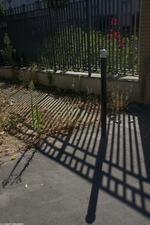Perfumes That Sing Vs. Perfumes That Eat: Rooting for the Return of the Aerial in Perfumery {Scented Thoughts}
1931 advert for Un Air Embaumé by Rigaud from Memory Pub
Smelling some recent releases in the past few days, one of them being Lyric by Amouage, it has struck me how, precisely, perfumes might have lost their lyrical, limpid and aerial quality and that this is the reason why artistic director Christopher Chong, an opera singer by training, might have wanted to recapture that quality with both the Jubilation (2007) and Lyric (2008) duos. These fragrances do make me think of the opera, but do they make me feel that they are like a voice that soar with longing in the air and makes an opera house come alive or even riotous as in the olden days? Not necessarily. In the case of Jubilation for Women I readily think of a sumptuous stately marble and golden staircase strewn with ladies in evening attires making their way to the deep velvety reds of their private boxes; in fact the image that superposes itself on the impression of the scent is that of an advert from the beginning of the 20th century depicting such a scene for the once wildly popular Un Air Embaumé (Balmy Air) by Rigaud. In the case of Lyric for Women, I also think of the ruby reds of the opera house but more also of a fine dinner by candlelight taken after the performance, a little Dame-aux-Camélias like. Somehow, the first perfume by Amouage, Jubilation, seems to allude to the anticipatory moments of emotion prior to going to listen to the opera. Somehow, the second fragrance, Lyric, makes me think of a night after the opera, of a meal taken à médianoche with its hedonistic hints of wine, roses, and something palatable like chocolate and vanilla. Lyric is billed as a floral oriental and the rose is its major floral note, but it seems to my nose to contain the olfactory allusions of a gourmand oriental as well, like so many other perfumes nowadays. It is even more subtle than that; it is not really gourmand, it is gourmand by allusion as the oriental notes have been worked in such a way as to be on hanging on the cliff of a gentle precipice called ganache...
A little discomfited by my lack of perception of a strong lyrical element in Lyric by Amouage and furthermore noticing that a few other scents seemed to call me prosaically to lunch or dinner or at best a romantic midnight supper as in the case of Lyric, I felt the need to spray on a classic to see if it was just my nose or me or anything but the scent itself. I decided to turn to Joy by Patou for immediate convenient reference to see if I perceived it likewise as a somewhat hungry perfume, a typically French perfume bespeaking of the pleasures of the table. As it turns out, it may not sing but it sing-songs, it hums, it contains much more that elusive soaring principle. Yes, indeed, it is a perfume that belongs to a different era and does not seem to need to eat, to reassure itself or the perfume-wearer with food. The cocooning of the 1990s had not left its mark on perfumery yet.
Since the French but also global triumph of Angel by Thierry Mugler (1992), many a brand have attempted to inject something that feels like comfort food into fragrances. Sometimes it is entirely appropriate, subtle, well-done, even passionate and at other times it feels like an obligatory passage that expresses nothing but the Zeitgeist as in a convention. Perfumes are made to make people dream, should they be made to systematically reassure them? Or has it become far too obvious in this time of economic crisis that the fragrance brands are being condescending by selling to the population perfumes that feel like they might be the equivalents of the first importations of potatoes from the new world to the old world to counter famine? In other words, have we seen the progressive replacement of the nostalgic wintry Christmas fair theme from Strasbourg that Thierry Mugler wanted Angel to contain with its implicit dose of childhood wonderment, with the theme of the present-day earthy Hachis Parmentier principle meant to tie you over and reassure you in times of need?
The foody theme in perfumery has been a matter for internal struggle for some perfumers, like famously for Edmond Roudnitska who although he created Femme by Rochas with its prune, plum and peach nuances was self-critical of this direction of creation in perfumery which he probably perceived as being too literal, prosaic and easy in a culture, the French one, that is very gustatory. In this sense, the references can appear quotidian and pedestrian, lacking in exoticism, lazy even perhaps. The same olfactory references will appear differently to someone from outside that culture as experienced daily. This is the reason why from an Euro-centric perspective spices can make us dream of the unusual and titillate our brains before making us think of the chicken masala curry we had for lunch or the chai we drink on street corners. A certain distanciation works in favor of the Baudelairian perfume as is best exemplified by Serge Lutens but also, more minimally, by L'Artisan Parfumeur. More deeply, it is also important to keep the distinction in mind between a literal foody reference and one that serves as a pretext for memories, imagination and thought process. One is about the smell of food, the other about the smell of time or encounter with a new culture.
Today and in this respect at least, the world of perfumery is non-Roudnitska like. Guerlain artistic director Sylvaine Delacourte admits that she cannot but think of edible references when creating a perfume. The latest masculine fragrance from the house invites you to smell a Mojito. Perfumers are constantly inspired by dishes and drinks, which is still an easy and satisfying way to access untapped perfume ideas.
And what about the more disembodied principle of air? Jean-Claude Ellena thinks that it is very difficult to achieve, more difficult than water actually, which is to say that a new generation of aerial perfumes will come about when perfumery decides it is mature enough to do so. Then we will look retrospectively at the category "fresh" and see that it contained that aerial principle only it was weighted down by water.
For now I dream of perfumes that sing and that are not just elemental. I dream of perfumes that come alive like voice coupled with air and which seem to reach for the heavens instead of falling down, ineluctably, like a chocolate soufflé losing its aerial principle.









I agree with you that the world of perfumery is non-Roudnitska like. Guerlain artistic director Sylvaine Delacourte admits that she cannot but think of edible references when creating a perfume. The latest masculine fragrance from the house invites you to smell a Mojito. Perfumers are constantly inspired by dishes and drinks, which is still an easy and satisfying way to access untapped perfume ideas.
abnehmen tipps
This suspicion that making perfumes inspired by foody flavors and sweetness is too easy was precisely something that Edmond Roudnitska had issues with post-Femme de Rochas. When you want to create demanding art, an ideal that this perfumer had, you want to dissociate yourself from the dish you had for lunch or the jam you ate as a kid. The French especially can feel it's all too easy and hedonistic an approach.
Guerlain used to be inspired by love and it is a change to see Guerlain perfumes inspired by material objects, exotic accords rather than a more spiritual, amorous, and erotic approach.